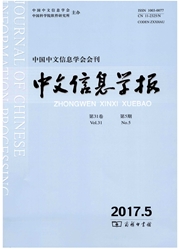

 中文摘要:
中文摘要:
中文微博情感分析旨在发现用户对热点事件的观点态度.已有的研究大多使用SVM、CRF等传统算法根据手工标注情感特征对微博情感进行分析.该文主要探讨利用深度学习来做中文微博情感分析的可行性,采用递归神经网络来发现与任务相关的特征,避免依赖于具体任务的人工特征设计,并根据句子词语间前后的关联性引入情感极性转移模型加强对文本关联性的捕获.该文提出的方法在性能上与当前采用手工标注情感特征的方法相当,但节省了大量人工标注的工作量.
 英文摘要:
英文摘要:
Chinese micro-blog sentiment analysis aims to discover the user attitude towards hot events. Most of the current studies analyze the micro-blog sentiment by traditional algorithms such as SVM, CRF based on hand-engineered features. This paper explores the feasibility of performing Chinese micro-blog sentiment analysis by deep learning. We try to avoid task-specific features, and use recursive neural networks to discover relevant features to the tasks. We propose a novel model - sentiment polarity transition model - based on the relationship between neighboring words of a sentence to strengthen the text association. The proposed method achieves a performance close to state-of-the-art methods based on the hand-engineered features, but saving a lot of manual annotation work.
 同期刊论文项目
同期刊论文项目
 同项目期刊论文
同项目期刊论文
 期刊信息
期刊信息
